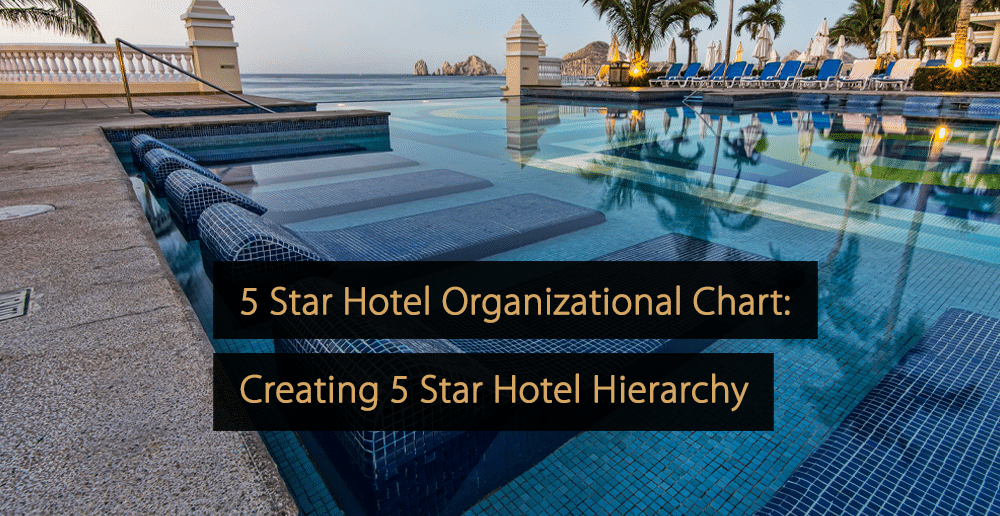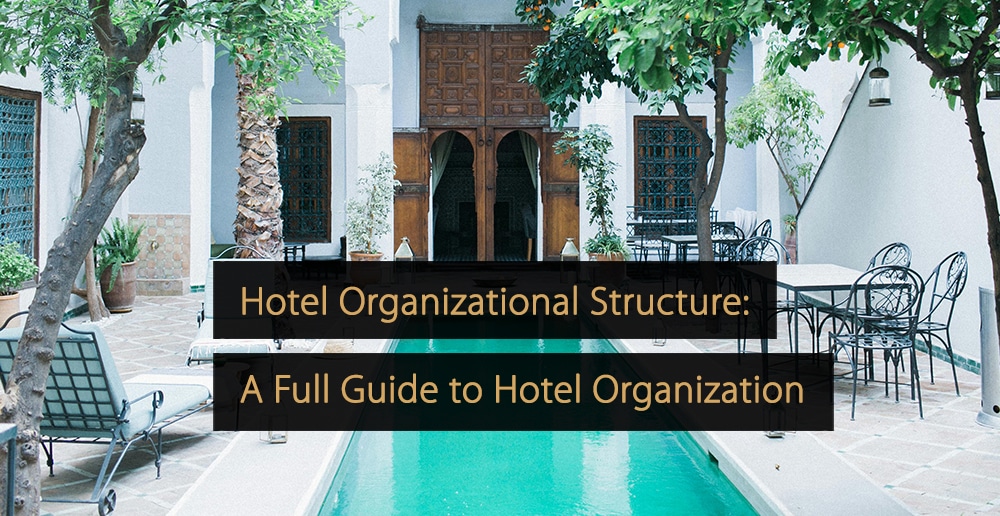Hotel departments are the different sections that make up a hotel or resort business. A hotel is a complex system, requiring several departments to function and work together to create a cohesive whole. In this article, you’ll learn all about the different departments required to run a hotel, from the front desk to accounts and credits.
Table of Contents:
- What Is the Hotel Industry?
- What Are Successful Hotel Operations?
- What Are the Different Hotel Departments?
- Vital Software Needed for Successful Hotel Department Operations
- Hotel Housekeeping Tips
- Hotel Software Solutions
What Is the Hotel Industry?
Generally speaking, it can be defined as the part of the service sector that provides accommodation for people who need somewhere to stay overnight. The term “hotel industry” is broad, covering everything from conventional hotels and motels to short-term apartment rentals, resorts, and hostels. The hotel industry isn’t typically associated with long-term or permanent living situations; with that said, many hotels do provide accommodation for a small number of longer-term guests. Because of its nature, the hotel industry is tied to the tourism and travel sector.
The hotel industry forms one of the biggest parts of the service and leisure industries. According to the Travel & Tourism – Worldwide Report by Statista, the hotel market volume is $446.5 billion in 2024. For more in-depth information, take a look at “Hotel Industry: Everything You Need to Know About Hotels!” In this article, you’ll learn everything you need to know about the hotel industry, its range of accommodations, and its connections to travel and tourism.
What Are Successful Hotel Operations?
The term “successful hotel operations” refers to the overall process of a hotel’s day-to-day running. For a hotel to operate successfully, each department must function well as a unit and in unison with all the other departments. The various sections of the hotel must operate in synergy to provide guests with the best possible experience.
Successful hotel operations include everything from a smooth and effective check-in through the front desk department, clean and inviting rooms thanks to the housekeeping department, well-maintained facilities kept up by the maintenance department, and so on. With the rise of COVID-19, hotel operations have become even more demanding. The need for additional hygiene precautions, health checks, and other measures has added a layer of complexity to hotel operations. The hotel manager, the person responsible for every single department, oversees all of this.
What Are the Different Hotel Departments?
Different hotels will have different departments, depending on the complexity of their operations. Here are some of the main departments most hotels need to operate.
Management and Finance Department
A hotel manager needs to function well under pressure and be ready to perform tasks requiring a range of skills. A hotel manager must be able to go from conducting staff interviews or coping with plumbing or electrical issues, to handling complaints from guests and more. In addition to taking care of essential services like guest rooms and catering, a manager must interact with suppliers and outside contractors, supervise conferences and other events, oversee maintenance, upkeep, and renovations, and troubleshoot any problems.
Hotel managers are also responsible for conducting inspections and ensuring safety, security, and compliance with regulations. Hotel managers need to keep occupancy levels as high as possible and deal with many of the financial aspects of the business. They must track revenue and expenditure, manage budgets, optimize profits, analyze sales and set targets, and identify optimal pricing and distribution tactics.
Food & Beverage Hotel Department
Food and Beverage (often shortened to F&B) is one of the most important departments in any hotel. Both casual visitors and hotel guests need to be provided with food and drink. It’s often the biggest department in the hotel and is tasked with procuring food, drinks, and materials, as well as storage, preparation, and serving. The serving of food and beverages might occur in a restaurant or bar setting, as part of room service, or in the context of conferences and similar events.
If the hotel has a restaurant on the premises, F&B will typically be one of the largest departments in operation and revenue, second only to the rooms department. Bars and restaurants will also help shape public perceptions of the hotel, as casual visitors will often drop by to eat or drink even if they don’t stay there. Thus, the F&B department has a significant impact on hotel revenue.
Front Office Hotel Department
The front office is often termed the “face” of the hotel. The Front Office handles checking in and out, assignment of rooms and rates, room status tracking, payments, and guest records. This department also develops and maintains an accurate and up-to-date record of guest information, manages guest services, and generally works to ensure customer satisfaction.
The activities of the Front Office are very important for the hotel’s relationship with the public, as it’s the first point of contact for guests and other visitors. A front office department that runs smoothly and efficiently will make all the difference to guest satisfaction. As well as handling reservations and payments, the front office will field requests, queries, and complaints, liaising with other departments to ensure that guests’ needs are met.
Video: The Front Office Department: Hotel Management
Housekeeping Hotel Department
The housekeeping department ensures that the rooms and other spaces in and around the hotel are clean, inviting, well-maintained, and safe. It’s the job of the housekeeping department to see that the entire hotel — the guest rooms and suites, the public areas, the staff areas, and exterior spaces like the grounds and parking facilities — are aesthetically appealing and that everything is in good condition.
Housekeeping will primarily coordinate with the front office department, as they are responsible for turnarounds (cleaning and making up rooms in between guests), as well as handling some guest services like providing extra towels, bed linen, or toiletries. Housekeeping will also be liaising with the maintenance or engineering department when repairs need to be made. Of course, they will have regular interactions and meetings with hotel management to ensure everything runs smoothly.
Maintenance Hotel Department
The maintenance department is responsible for the physical upkeep of all the hotel buildings. This department oversees the repair and operation of the plumbing, heating, air conditioning, and ventilation systems. Maintenance also oversees any cold water plants or central steam systems. The maintenance department typically has a regular schedule but may also handle requests when they come in. It’s their job to ensure that all of the equipment and facilities in the hotel are kept in good order.
Proper maintenance is important, as breakdowns in any system can affect the smooth running of the hotel. There are two kinds of maintenance. Protective maintenance is the systems’ general inspection and upkeep to prevent breakdowns or malfunctions. Reactive maintenance includes repairs and replacements for systems or equipment once a problem has arisen. The maintenance department will handle both.
Reservations & Marketing Hotel Department
The reservations department’s responsibilities include making and adjusting hotel bookings. They are also tasked with keeping room availability updated and current, avoiding errors such as over or underbooking. This department will liaise directly with travel agents and tour operators. They’ll also work closely with marketing to optimize room sales. Reservations and marketing will thus bear much responsibility for building hotel revenue.
Programs must be developed to make the most profitable use of the hotel’s rooms and other facilities, increasing occupancy through effective marketing and promotion and determining optimal price points. It’s the task of the reservations and marketing departments to make sure that the hotel’s revenue is everything it can be. This means that their activities can have a dramatic effect on the successful operation of the hotel.
Human Resource Hotel Department
Well-trained, experienced staff are crucial to the successful operation of a hotel. It’s the responsibility of the human resources department to recruit staff, deploy them in appropriate roles, train them, and make sure their skills remain up to date. The human resources department is tasked with developing the hotel’s personnel. Part of the HR department’s job is to assess performance and compliance with hotel regulations. This means that HR will also be engaged in administering an internal justice system, ensuring that this is impartial and transparent.
The role of a modern HR department isn’t simply the hiring and firing of staff. It is to manage and develop the hotel’s human resources, assisting employees in their professional development and skills acquisition to fulfill their roles most effectively. Because staff will have regular contact with the public and the quality of their work directly affects the guest experience, an effective HR department is essential.
Table: Positions in the HR Hotel Department, Main Tasks and Skills Needed
| Position | Main Tasks | Key Skills Needed |
|---|---|---|
| HR Manager | – Develop HR policies and procedures. – Oversee HR staff and department. |
– Leadership and management skills. – Knowledge of labor laws and regulations. |
| Recruitment Specialist | – Conduct candidate sourcing and screening. – Interview and select qualified candidates. |
– Strong interviewing and assessment skills. – Attention to detail and organizational skills. |
| Employee Relations Specialist | – Mediate and resolve employee conflicts. – Address employee grievances and concerns. |
– Strong problem-solving skills. – Excellent communication and interpersonal skills. |
Vital Software Needed for Successful Operations of Hotel Departments
Hotel technology is an increasingly big contributor to the successful operation of a business in the hospitality industry. Many software systems can now dramatically enhance a hotel’s performance.
Hotel Property Management Systems (PMS)
A hotel PMS software solution facilitates daily operations and tasks for hotels and resorts. According to the Global Hotel Property Management Software Market Report by Research and Markets, the global hotel property management software market is projected to grow to $14.71 billion by 2030. A PMS makes management and administrative tasks easy across different hotel departments. A hotel PMS will usually be designed to handle reservations and payment processing; it will also assist in inventory management and performance analytics. Any modern hotel can benefit from a PMS. Bookings will likely come in via multiple channels, while room rates and other charges may need adjustment.
Using a PMS can remove many of the headaches involved in the day-to-day running of a hotel, freeing up staff for more important tasks and improving customer service. A PMS may have many features, including reservation and check-in functionality, housekeeping technology, and customer data management. To learn more, read “PMS System: What Are the Most Important Features?”
Hotel Point of Sale (POS) Systems
Point-of-sale systems are used to handle any retail transaction. POS technology is increasingly important in the hospitality industry, as it streamlines payments for rooms, services, and items such as food, beverages, or toiletries. A modern POS system can handle a range of different payment types and access information such as inventory, room availability, and other data. There is a bewildering range of different POS systems on the market, offering different drawbacks and benefits.
Should you opt for a legacy POS or move to cloud-based technology? Can third-party systems be integrated with your POS? How secure are they? Which hotel departments need a POS system? In “POS Systems: Overview and Importance in the Hospitality Industry”, you’ll learn about POS systems, what they can do for your business, how to choose the right POS for your hotel, and how best to implement one.
Revenue Management Systems (RMS)
Calculating room rates and coordinating marketing strategies that will be most effective for your hotel can be difficult. All kinds of factors can come into play, such as the season, the requirements of a specific guest, the number of rooms available, and the current state of the market. It can be difficult to set the best price points. Should you charge a lower rate and potentially miss out on revenue, or set a higher rate and risk customers looking elsewhere? How much should you charge for food, beverages, and services?
An RMS can help here by ensuring that every customer gets the most appropriate available room at the correct price. Every hotel department has its part to play in optimizing revenue; a modern RMS can help centralize all your important revenue management decisions. To learn more, read “Revenue Management System (RMS): What Are the Advantages?”
Hotel Housekeeping Tips
Sparkling clean, well-organized rooms are a mark of quality in the hotel industry. The housekeeping hotel department is vital in creating the ideal guest experience. Cleaning hotel rooms used day and night can present a challenge, though. Experienced housekeeping staff has an arsenal of tricks for getting rid of everyday dirt and grime, leaving hotel rooms in pristine condition for the next guest.
In “Hotel Housekeeping Guide: Tips & Tricks to Clean Your Hotel”, you’ll learn important tips and tricks for keeping hotel rooms pristine. Find out how to plan and prepare and how housekeeping technology can help you.
Hotel Software Solutions for Hotel Departments
Choosing and implementing the right software for your hotel is vital in today’s increasingly tech-driven hospitality industry. As hotel trends tend toward automation, staying on top of the latest developments is important. All kinds of software systems are designed to be deployed in hotels, from front-office technology to reputation management tools.
In “Hotel Management Software Solutions Every Hotel Needs”, you’ll discover five of the most important types of hotel software and how they can work for you. There’s a software solution that can help every hotel department.
Hotel Departments FAQs
While hotel departments may seem disparate, every department must work together. Transparency and communication are key to the effective running of a hotel. Each department should work to support the others in delivering the best possible guest experience.
Did You Like This Article About Hotel Departments?
You might also be interested in the following articles:
- Food Ordering System: How to Choose the Best One for Your Property?
- Hotel Asset Management: Definition, Importance, and Practices
- Hotel Door Locks: The Main Lock System Types and Their Benefits
- Front Office Technology: The Latest Tech for the Reception Department
- Smart Hotel Technology; Technologies to Smart Up Your Hotel
More Tips to Grow Your Business
Revfine.com is the leading knowledge platform for the hospitality and travel industry. Professionals use our insights, strategies, and actionable tips to get inspired, optimize revenue, innovate processes, and improve customer experience.Explore expert advice on management, marketing, revenue management, operations, software, and technology in our dedicated Hotel, Hospitality, and Travel & Tourism categories.
This article is written by:
Hi, I am Martijn Barten, founder of Revfine.com. With 20 years of experience in the hospitality industry, I specialize in optimizing revenue by combining revenue management with marketing strategies. I have successfully developed, implemented, and managed revenue management and marketing strategies for individual properties and multi-property portfolios.











Excellent information for hotel classes.